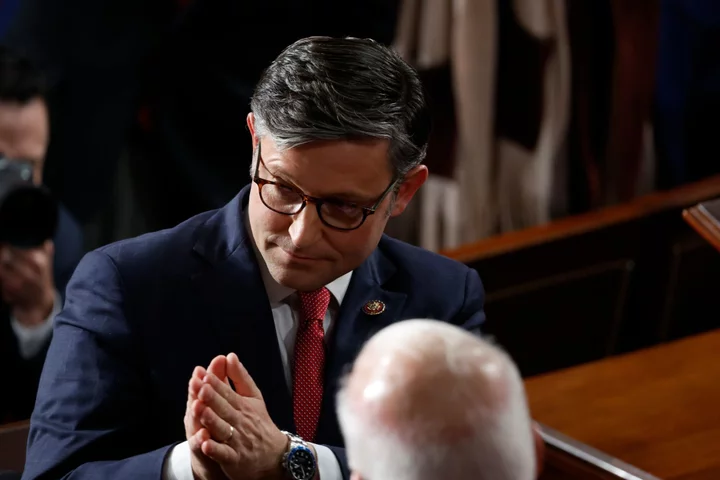Speaker Mike Johnson, the little-known Louisiana congressman who emerged from a hardliner revolt as House Republicans’ new leader, is short on both time and experience to avert a US government shutdown.
The novice to major Washington negotiations plans to release as soon as Thursday his proposal for temporary government funding that will set the tone for talks and signal the risk of a Nov. 18 federal funding lapse.
That gives the new speaker barely a week to make his opening gambit and choose how far to go in his demands to bolster his support among ultra-conservatives who ousted his predecessor, Kevin McCarthy.
The House plans to vote on Tuesday on the plan, lawmakers said. If Johnson’s plan demands immediate cuts he will provoke a standoff with the Democratic Senate which will refuse to go along.
GOP Divisions
Hardliners are insisting on deep spending cuts, just as they did ahead of the last Oct. 1 shutdown deadline. McCarthy was toppled after defying them.
Johnson will need the support of virtually all Republicans unless he offers a bipartisan plan acceptable to Democrats. He can only afford four defections on a party-line vote.
Virgina Representative Bob Good, who voted to oust McCarthy, said members of the ultraconservative Freedom Caucus would like to see Johnson leverage the temporary funding by requiring immediate spending cuts and changes to US asylum laws.
“We’ve got to get our spending under control and our border secured,” he said.
Johnson is enjoying a honeymoon period with such conservative rebels so bucking them may not lead to an immediate ouster.
“If Mike Johnson tells me it’s going to snow in August, I’m headed down to Mayo’s in Knoxville to buy me a sled,” said Tennessee’s Tim Burchett, one of the rebels who ousted McCarthy. Burchett said conservatives are willing to give Johnson some latitude for now.
One idea being pushed by conservatives is to set up a series of separate shutdown deadlines by funding some government agencies to through Dec. 7 and others to Jan. 19. Another two-step option has end dates in January and February.
The two-step options are running into skepticism from more traditional Republicans and appropriators who worry it could foster chaos at agencies with differing shutdown dates.
Appropriations Committee senior member Robert Aderholt, an Alabama Republican, said Johnson plans to make a decision Thursday or Friday.
The speaker’s negotiating position with the Democratic-led Senate is weakened because House Republicans are divided on key federal spending issues and have been unable to pass all 12 regular full-year spending bills that were due Oct. 1.
Top spending panel Democrat Rosa DeLauro said the troubles Johnson has passing GOP-only spending bills show he’s engaged in an “exercise in futility” and the best approach is to engage in immediate bipartisan talks with Democrats.
Senate Outlook
In the Senate, hopes to combine temporary funding to keep open the government with emergency aid for Israel and Ukraine are fading because of a dispute over border policies. That makes it likely that the Senate will only have the votes to pass short-term funding without additional conditions.
Rank-and-file senators have tried to reach a compromise on new asylum rules and border policy changes.
But Senator Thom Tillis, a North Carolina Republican who is involved in the immigration talks, told reporters not to expect an agreement on the issue before the Nov. 18 shutdown deadline.
Top Senate spending panel Republican Susan Collins said she wants a stopgap into December as she works to craft a combined Ukraine, Israel and border bill in the coming weeks.









